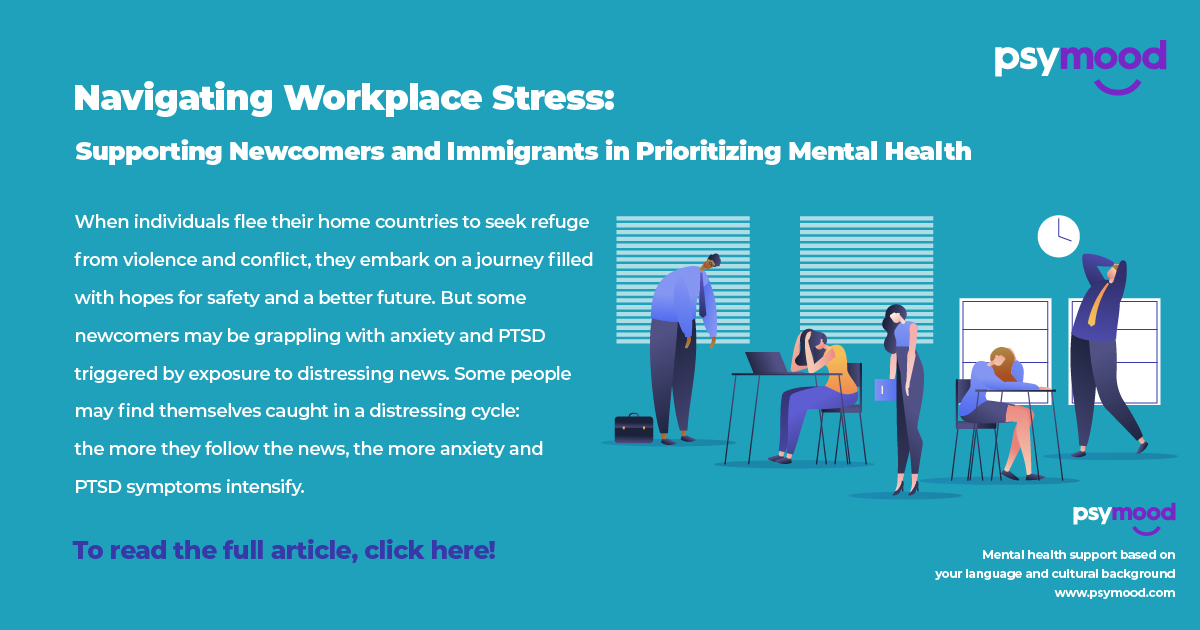Navigating Workplace Stress
Supporting Newcomers and Immigrants in Prioritizing Mental Health
Workplace stress is a common concern that affects individuals across various industries, but it can have unique implications for newcomers. The process of adapting to a new work environment, cultural differences, language barriers, and the pressure to succeed can contribute to heightened stress levels. In this blog, we will explore the challenges faced by newcomers in relation to workplace stress, while highlighting the importance of prioritizing mental health and providing support.
Cultural Adjustment and Integration
Let’s first look at how adjusting, integrating, and adapting to new surroundings can affect newcomers. Newcomers often face the dual challenge of adapting to a new work culture and acclimating to a different country’s societal norms. This adjustment process can be overwhelming and contribute to heightened stress levels. Understanding cultural nuances, unwritten rules, and communication styles within the workplace is essential to navigate these challenges successfully.
Cultural adjustment and integration have a significant impact on the mental health of newcomers. Here are some ways in which this process can affect their well-being:
- Social Support and Networks: Building social connections is crucial for mental well-being. Newcomers often face the challenge of establishing social networks in their new environment. The lack of supportive relationships and a sense of community can contribute to feelings of loneliness, isolation, and heightened stress levels. Without a strong support system, adjusting to a new culture and workplace can become even more challenging.
- Identity and Belonging: Adjusting to a new culture involves navigating unfamiliar social norms, values, and expectations. Newcomers may experience a sense of cultural dissonance, where their own beliefs and practices differ from those around them. This can create a feeling of not fully belonging, leading to identity conflicts and psychological distress.
- Role Changes and Employment Challenges: Newcomers often experience changes in their professional identities and employment opportunities. They may face challenges such as obtaining recognition for their skills and qualifications, finding suitable employment, or navigating unfamiliar workplace practices. These challenges can lead to feelings of frustration, inadequacy, and job dissatisfaction, impacting their overall mental well-being.
Language Barriers and Communication
Language barriers can significantly impact workplace interactions and contribute to stress. Limited proficiency in the local language may hinder effective communication, leading to misunderstandings, isolation, and feelings of incompetence. Employers and colleagues can play a crucial role in creating inclusive environments by offering language support, encouraging clear communication channels, and fostering understanding and patience.
Discrimination and Bias
Unfortunately, newcomers and immigrants may face discrimination or bias in the workplace due to their cultural background, accent, or immigration status. These experiences can lead to increased stress, anxiety, and feelings of exclusion. Organizations should prioritize diversity, equity, and inclusion initiatives, including awareness training, unbiased recruitment practices, and creating safe spaces for open dialogue to combat discrimination.
Work-Life Balance
Balancing work and personal life can be especially challenging for newcomers and immigrants who may face additional responsibilities and pressures. Factors such as building social connections, supporting family members, or dealing with visa issues can further strain their well-being. Employers can promote work-life balance by offering flexible schedules, promoting self-care practices, and providing resources for mental health support.
Cultural Support Networks
Building and nurturing support networks within the workplace is crucial for the mental well-being of newcomers and immigrants. Encouraging employee resource groups, mentoring programs, and cultural awareness initiatives can help individuals feel connected, supported, and valued within the organization.
Final Thoughts
Recognizing the unique challenges faced by newcomers and immigrants in relation to workplace stress is essential for fostering an inclusive and supportive work environment. Employers, colleagues, and society as a whole play a vital role in providing resources, empathy, and understanding to ensure the well-being and success of these individuals. By prioritizing mental health, addressing cultural barriers, and promoting diversity and inclusion, we can create workplaces that embrace the strengths and contributions of newcomers and immigrants while nurturing their overall mental well-being. Together, we can build a more inclusive and supportive future for all.
PsyMood is a digital tool designed to help you find the support you need in the language that you are most comfortable with. PsyMood considers cultural background, geographical location, interests, and personal needs, amongst other factors, to pair you with service providers for either online or in-person therapy sessions.


.png)
.png)
.png)
Recent Comments